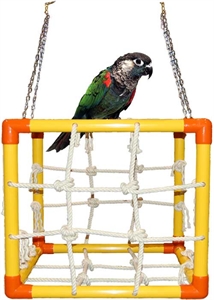Categories
- 10 Dollars and Under
- 5 Dollars and Under
- Avian Wear (Human and Feathered)
- Avitech
- AVIX Products
- Bees Wax Candles
- Bird Beds
- BIRDCARE Company Supplements
- Birdie Breads / Cookies
- Birdie Mashes
- Books / DVDs / Clickers
- Cage Accessories and Liners
- Cages
- Christmas Ideas
- Dishes, Bottles, Skewers
- Egg Food, Cuttle / Mineral
- Gift / Personal Items
- Gift Certificates
- Goldenfeast Gourmet Blends
- Hand Rearing / Nesting Supplies
- Harnesses / Travel Carriers
- Health / Wellness / Grooming
- Lighting / Lamps
- Lory Diets
- Molly's Bird Toys
- Nutritional
- Organic / Sprouters
- Parrot Greeting Cards
- Pellets
- Perches & Swings
- Perches FLAGSTONE
- Pest Control, Disinfectant Clean
- Pet Memorial
- Play Stands, Trees, Hanging Gym
- Poultry
- Ribbons &Bows, Doggies & Critter
- Seeds
- Snacks & Treats
- Toy Parts
- Toys
- Toys For the Feet
- Twin Beaks
- Window Decals
- Wingdow Seats
- Featured Products ...
- All Products ...
Manufacturers
Information
More Information
Vitamins
A vitamin is an organic compound that is considered to be metabolically essential in small amounts in animal tissues. Vitamins are critical to good health.
-
Fat Soluble Vitamins. Found in fatty compounds and are carried in the body by fasts. Not soluble in water but are normally found in dissolved fats and are stored in the body.
-
Vitamin A (Beta Carotene) is stored in the liver and is needed for good vision. It is essential for resistance to infections, particularly in the sinuses. It belongs to the group of vitamins that are known as carotenoids. It is important for healthy eyes, skin and mucous membranes. Can be found in most fruits, yellow or green vegetables including carrots, squash, pumpkin, sweet potato, spinach, apricots, cantaloupe, dandelion leaves, red chili peppers, broccoli, peaches, egg yolk and peas.
-
Vitamin D regulates the absorption of calcium from the intestines. Without enough Vitamin D, the absorption of calcium is slowed, which can cause inadequate bone development. This can lead to rickets or fragile bones. Vitamin D is also called the "sunlight" vitamin as it is produced in the skin by ultraviolet rays from the sun. Vitamin D3 is the only D vitamin that birds can use. Foods that have Vitamin D included egg yolks, some cereals, cheese.
-
Vitamin E. Eight forms of vitamin E are found in plants. Vitamin E is an antioxidant, which is used by the body to prevent chemicals in the body from damaging cells. This is sometimes referred to as the "sex" vitamin as is necessary for the pituitary, adrenal and sex hormones. Vitamin E works together with other minerals, especially selenium. Can be found in whole grains, some cereals, fresh leafy green vegetables such as spinach. Safflower oil, canned peaches, dried prunes, asparagus, broccoli, sweet potato, sunflower seeds, walnuts, almonds, Brussels sprouts and whole grain breads.
-
Water soluble Vitamins. Stored in the body but are washed away with water, so they must be replenished continually.
-
Vitamin K. Ensures proper blood clotting through the manufacture of prothrombin (the factor in blood that causes clotting). Synthesis occurs in the intestines. Is vital for proper liver function. Most diets have adequate vitamin K. Found in green vegetables including broccoli, cabbage, asparagus, peas, green beans, turnip greens, spinach and cheese. It is also produced by bacteria in the bowels.
-
Thiamin (B1) helps to maintain a healthy nervous system and B vitamins are also important in reproduction. Found in whole grains, peanuts, peas, raisins, oranges, dried beans, lentils, red kidney beans, sesame seeds, brazil nuts, almonds, pecans, asparagus, potatoes.
-
Riboflavin (B2) is involved in the release of energy from proteins, carbohydrates and fats in food. Also important for reproduction. Founds in eggs, milk, yogurt, chicken, asparagus, broccoli, Brussels sprouts, spinach and whole wheat bread.
-
Niacin is involved in many different body processes. It aids in the breakdown of fats and proteins and in red blood cell formation. Also important in reproduction. Found in all foods, but highest amounts are in animal products. In plants it is poorly absorbed. Found in chicken, beef, peanut butter, tuna, peanuts, sesame seeds, sunflower seeds, salmon, eggs and potatoes.
-
Biotin (B7) is necessary for many different body functions, including those that manufacture and break down fats, amino acids and carbohydrates. Biotin is stored in the liver. Excellent sources are liver, tuna, oatmeal, soybeans, eggs, peanut butter, brown rice, chicken, bananas.
-
Folic Acid functions in the formation of uric acid and is very important in the excretion of wastes through the kidneys. This makes folic acid crucial to the avian diet. Sources are alfalfa, spinach, broccoli, some cereals, chick peas, oranges, peanuts, Brussels sprouts, wheat germ, red beans, bananas, whole wheat bread and wheat bran. Also produced by bacteria in the bowels.
-
Cobalamine (B12) is necessary for maximum growth in young birds. Also important in reproduction. Even though bacteria in the gut can produce B12, it is not a dependable source. Vitamin supplements provide adequate supplies of B12. Found in eggs, lean meat, wheat germ, soy beans, peanuts and peas.
-
Pantothenic Acid (B3) is involved in the production of fats, cholesterol, bile, vitamin D, red blood cells and some hormones and neurotransmitters. Seed diets are adequate in supplying pantothenic acid. It can be found also in eggs, chicken, soy beans, peanut butter, bananas, potatoes, broccoli, beef liver, grapefruit, corn, cauliflower, eggs, rice, cantaloupe, wheat germ, breads.
-
Pyridoxine (B6) functions in the building and breaking down of carbohydrates, fats and proteins. It is mainly involved with proteins and amino acids. Can be found in both plants and animal products. Very little is stored in the body. Most practical diets require the addition of B6 for growth. Bananas, corn, sunflower seeds, Brussels sprouts, some cereals, squash, chicken, potatoes, grapefruit, spinach, rice peas, walnuts and peanut butter are all good sources.
-
Ascorbic Acid (Vitamin C) aids the formation and maintenance of a protein that forms the basis in connective tissue, as well as the supporting material in the blood vessel wall. It helps to bind the muscle tissue together. It aids in the healing of wounds, fractures, bruises and forms a protective barrier against infections or disease. Some birds need vitamin C added to their diet, while other birds can manufacture enough in their livers or kidneys. Vitamin C is safe to add to diets, because as a water soluble vitamin, any excess flushes out of the bird's system rather tan being stored in the body like many other supplements. Can be found in citrus fruits, strawberries, pears, a variety of buds, shoots and tropical fruit such as kiwi, papaya, mangoes. It is also found in Brussels sprouts, broccoli, green peppers, tomatoes, cantaloupe, cabbage, asparagus, green peas, potatoes, lima beans, bananas and carrots.
-
Choline. Is important in controlling fat and cholesterol in the body. It helps in preventing fat from accumulating around the liver. It also helps to regulate the liver and kidneys. Important for proper nerve transmission. Found in cabbage, egg yolks, liver, nuts, lentils and cauliflower.
Important Links
- A Bit About Us
- A Guide to the Selection of Safe Toys for your Bird(s)
- Amino Acids
- Common Problems that can Happen with Baby Chicks
- Birdcare Simple System
- Fruits
- Giardia
- Goldenfeast Gourmet Blends Ingredients Listing
- Guardian Angel
- Minerals
- Nuts
- Substances Toxic to Our Birds
- The Basic Nutrients
- Toxic and Non Tox Plants Shrubs Trees
- US to Metric Conversions
- Vegetables
- Vitamins
- Volkmans Label Ingredients
- Flight Suit Sizing Chart




